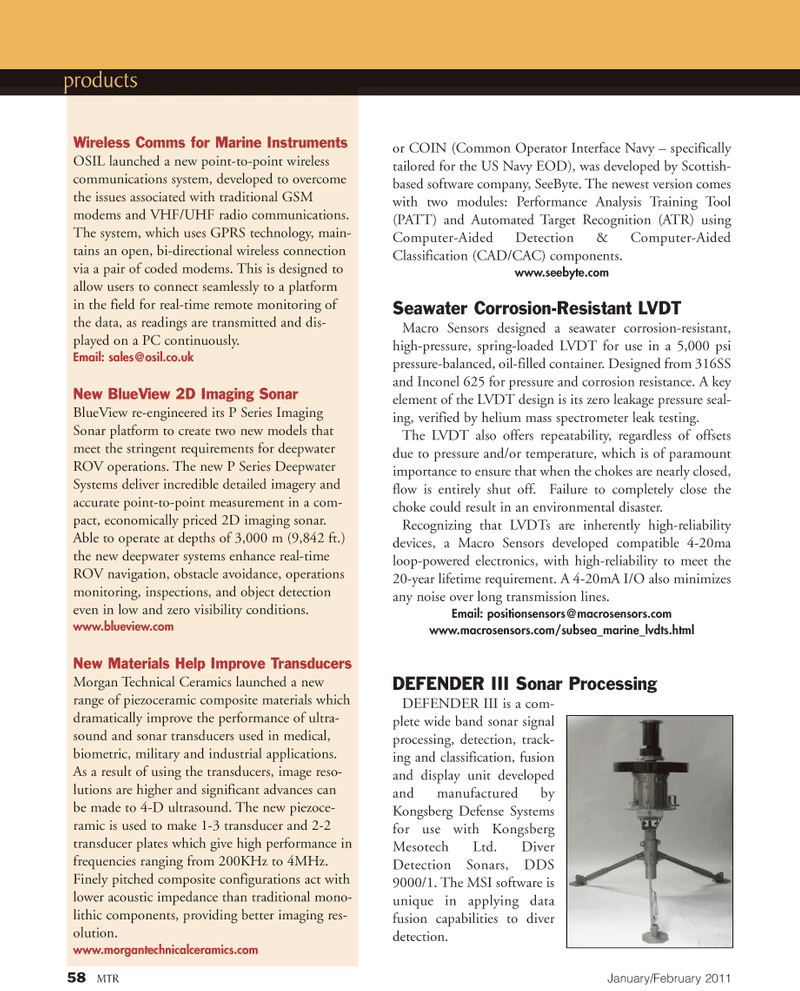
Page 58: of Marine Technology Magazine (January 2011)
Marine Salvage & Recovery
Read this page in Pdf, Flash or Html5 edition of January 2011 Marine Technology Magazine
Wireless Comms for Marine Instruments
OSIL launched a new point-to-point wireless communications system, developed to overcome the issues associated with traditional GSM modems and VHF/UHF radio communications.
The system, which uses GPRS technology, main- tains an open, bi-directional wireless connection via a pair of coded modems. This is designed to allow users to connect seamlessly to a platform in the field for real-time remote monitoring of the data, as readings are transmitted and dis- played on a PC continuously.
Email: sales@ osil.co.uk
New BlueView 2D Imaging Sonar
BlueView re-engineered its P Series Imaging
Sonar platform to create two new models that meet the stringent requirements for deepwater
ROV operations. The new P Series Deepwater
Systems deliver incredible detailed imagery and accurate point-to-point measurement in a com- pact, economically priced 2D imaging sonar.
Able to operate at depths of 3,000 m (9,842 ft.) the new deepwater systems enhance real-time
ROV navigation, obstacle avoidance, operations monitoring, inspections, and object detection even in low and zero visibility conditions. www.blueview.com
New Materials Help Improve Transducers
Morgan Technical Ceramics launched a new range of piezoceramic composite materials which dramatically improve the performance of ultra- sound and sonar transducers used in medical, biometric, military and industrial applications.
As a result of using the transducers, image reso- lutions are higher and significant advances can be made to 4-D ultrasound. The new piezoce- ramic is used to make 1-3 transducer and 2-2 transducer plates which give high performance in frequencies ranging from 200KHz to 4MHz.
Finely pitched composite configurations act with lower acoustic impedance than traditional mono- lithic components, providing better imaging res- olution. www.morgantechnicalceramics.com products 58 MTR January/February 2011 or COIN (Common Operator Interface Navy – specifically tailored for the US Navy EOD), was developed by Scottish- based software company, SeeByte. The newest version comes with two modules: Performance Analysis Training Tool (PATT) and Automated Target Recognition (ATR) using
Computer-Aided Detection & Computer-Aided
Classification (CAD/CAC) components. www.seebyte.com
Seawater Corrosion-Resistant LVDT
Macro Sensors designed a seawater corrosion-resistant, high-pressure, spring-loaded LVDT for use in a 5,000 psi pressure-balanced, oil-filled container. Designed from 316SS and Inconel 625 for pressure and corrosion resistance. A key element of the LVDT design is its zero leakage pressure seal- ing, verified by helium mass spectrometer leak testing.
The LVDT also offers repeatability, regardless of offsets due to pressure and/or temperature, which is of paramount importance to ensure that when the chokes are nearly closed, flow is entirely shut off. Failure to completely close the choke could result in an environmental disaster.
Recognizing that LVDTs are inherently high-reliability devices, a Macro Sensors developed compatible 4-20ma loop-powered electronics, with high-reliability to meet the 20-year lifetime requirement. A 4-20mA I/O also minimizes any noise over long transmission lines.
Email: positionsensors@ macrosensors.com www.macrosensors.com/subsea_marine_lvdts.html
DEFENDER III Sonar Processing
DEFENDER III is a com- plete wide band sonar signal processing, detection, track- ing and classification, fusion and display unit developed and manufactured by
Kongsberg Defense Systems for use with Kongsberg
Mesotech Ltd. Diver
Detection Sonars, DDS 9000/1. The MSI software is unique in applying data fusion capabilities to diver detection.

 57
57

 59
59
